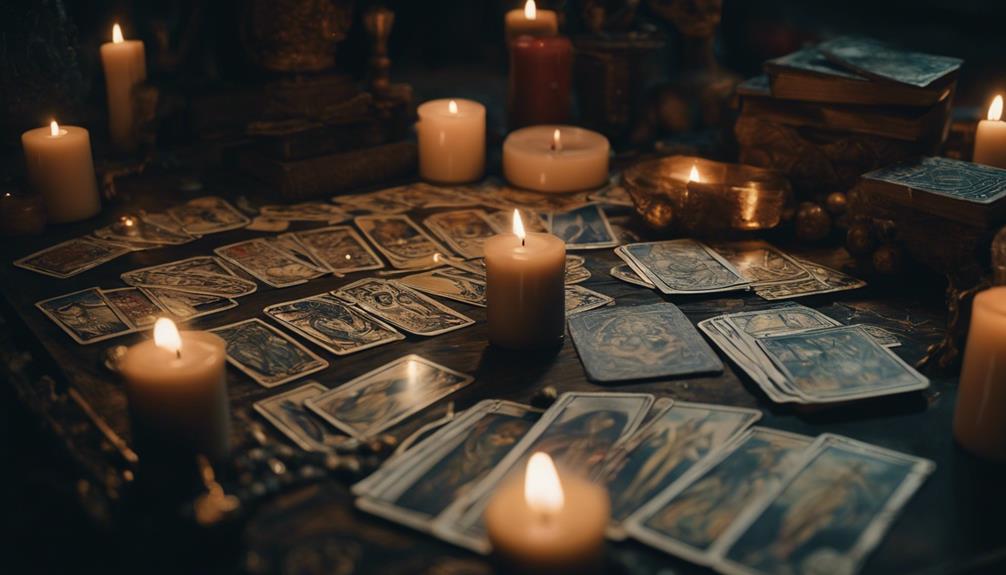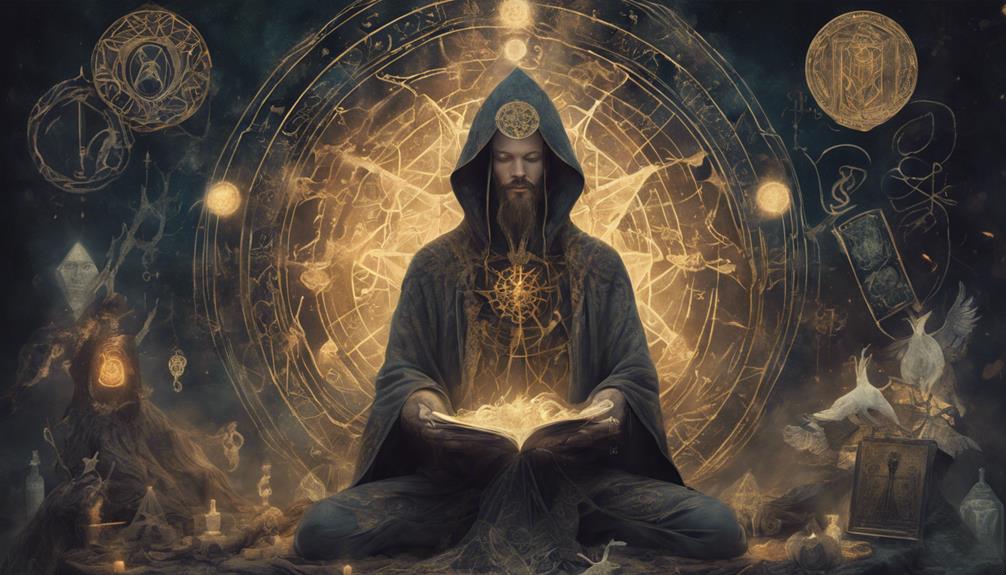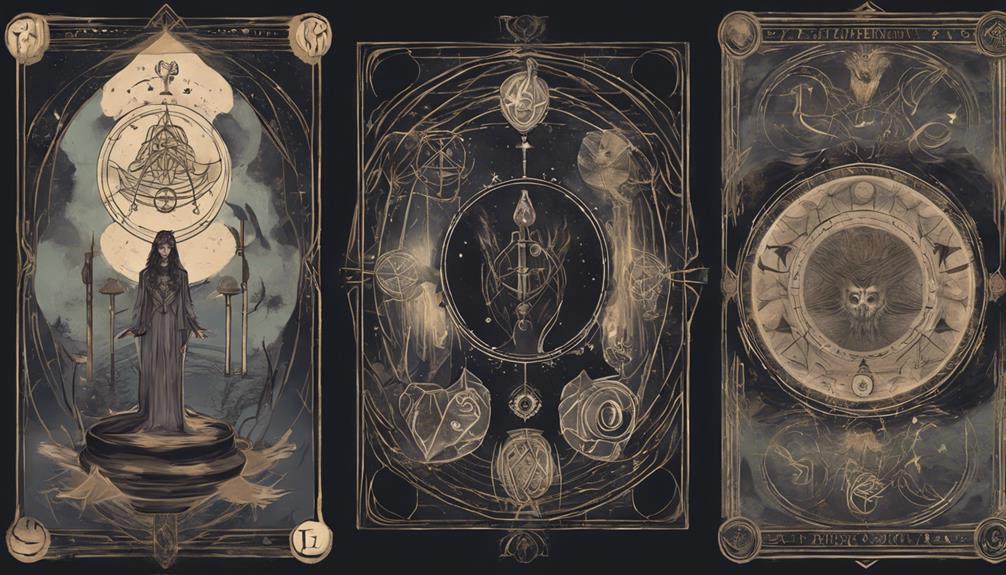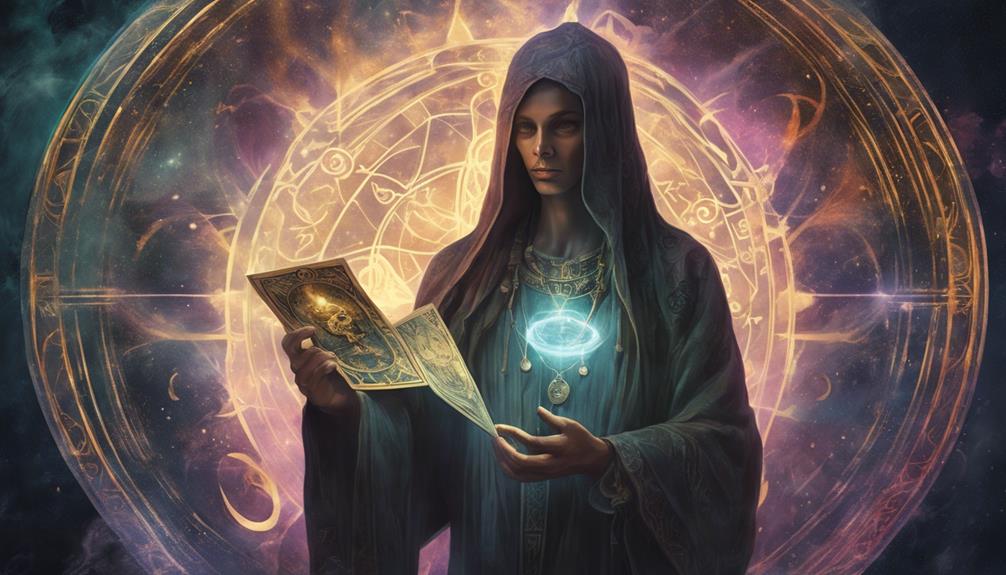What Role Did Eliphas Lévi Play in Tarot's Occult Revival?

Eliphas Lévi played a crucial role in Tarot's occult revival by intertwining mysticism and symbolism. He connected the cards to Kabbalah and Western Esotericism, and his teachings deeply influenced modern Tarot practices. Despite facing criticism and controversy, Lévi's impact on Tarot remains significant.
Early Life and Influences
Eliphas Lévi consistently reflected on his early life experiences and the diverse cultural influences that shaped his profound understanding of the occult. Born as Alphonse Louis Constant in 1810, Lévi's upbringing in France exposed him to a variety of early influences that would later play a vital role in his exploration of occult teachings. His deep fascination with mysticism and esoteric knowledge was nurtured by exposure to various philosophical and religious ideas prevalent during his formative years.
Lévi's immersion in the teachings of Kabbalah, alchemy, and ceremonial magic during his youth laid the foundation for his later works on the occult. Drawing from sources as varied as Christian mysticism, Freemasonry, and ancient Hermetic traditions, he synthesized a unique perspective that resonated with seekers of spiritual enlightenment. These early influences not only shaped his beliefs but also fueled his quest to unravel the mysteries of the universe through the lens of the occult.
Introduction to Occult Studies
Eliphas Lévi's profound understanding of the occult and his pioneering interpretations of Tarot cards laid the groundwork for a revival of interest in esoteric studies. The resurgence of Tarot as a tool for divination, spiritual growth, and self-discovery can be traced back to Lévi's influential teachings.
His legacy in the world of Tarot continues to inspire seekers and practitioners to explore the depths of symbolism, mysticism, and the interconnectedness of the material and spiritual domains.
Eliphas Lévi's Influence
With his profound understanding of esoteric symbolism and mystical teachings, Eliphas Lévi left an enduring impact on the domain of occult studies, shaping its foundation for generations to come. His influence can be seen through:
- Introducing the concept of correspondences between symbols, planets, and elements.
- Popularizing the idea of a universal connection between the microcosm and macrocosm.
- Utilizing the Tarot as a tool for spiritual development and divination.
- Emphasizing the importance of intuition and inner reflection in esoteric practices.
- Inspiring future occultists and mystics to explore the depths of symbolism and spirituality.
Lévi's visionary ideas continue to resonate in the occult world, contributing to the ongoing evolution of esoteric thought and practices.
Tarot's Occult Resurgence
Eliphas Lévi's pioneering work with esoteric symbolism laid the groundwork for the resurgence of Tarot within the domain of occult studies. Tarot's history intertwines with occult practices, evolving from a simple card game into a tool for divination and spiritual exploration. The fusion of Tarot's symbolic imagery with occult philosophies has captivated seekers of esoteric knowledge for centuries. This revival sparked a renaissance in understanding the interconnectedness between the cards and mystical teachings. By delving into Tarot's history, practitioners reveal a gateway to deeper insights into themselves and the universe. The occult practices surrounding Tarot offer a glimpse into the profound mysteries of existence, inviting individuals to explore the realms of intuition, symbolism, and spirituality.
| Tarot's History | Occult Practices | Spiritual Exploration |
|---|---|---|
| Symbolic Imagery | Mystical Teachings | Deeper Insights |
Legacy in Tarot
The legacy of Tarot within the domain of occult studies is marked by its enduring influence on spiritual exploration and the quest for deeper insights into mystical teachings. Tarot teachings have left an indelible mark on the world of occult philosophy, shaping the way individuals perceive and interact with the spiritual world. This legacy continues to inspire seekers on their journey towards self-discovery and enlightenment.
The profound symbolism embedded within Tarot cards serves as a gateway to revealing hidden truths and connecting with higher consciousness. Through the study and practice of Tarot, individuals are encouraged to investigate the mysteries of the universe and explore the depths of their inner being.
- Tarot's symbolic language offers a unique perspective on spiritual insights.
- The practice of Tarot encourages introspection and self-awareness.
- Tarot serves as a tool for divination and guidance in occult practices.
- The imagery in Tarot cards reflects universal archetypes and truths.
- Tarot's enduring presence in occult studies underscores its timeless wisdom.
Tarot Symbolism and Interpretations
Tarot symbolism holds a profound significance in occult practices, with the Major Arcana offering deep insights into universal truths and life's journey.
Meanwhile, the Minor Arcana explores the everyday experiences and challenges that shape our existence.
Understanding the meanings behind these cards reveals a wealth of wisdom and guidance for those who seek to explore the mysteries of the Tarot.
Major Arcana Meanings
Amidst the intricate tapestry of the mystical Major Arcana cards lie profound symbols that convey profound meanings and insights into the human experience. These archetypal images hold deep spiritual significance and mystical connections, offering a mirror to the complexities of our inner and outer worlds.
Here are five key Major Arcana card meanings:
- The Fool: Embracing new beginnings and adventures with a childlike spirit.
- The High Priestess: Revealing intuition, mystery, and the subconscious mind.
- The Tower: Signifying sudden change, upheaval, and transformation.
- The Sun: Radiating joy, success, and energy in all aspects of life.
- The World: Representing completion, fulfillment, and unity with the universe.
Minor Arcana Symbolism
Exploring the intricate symbolism and interpretations of the Minor Arcana in tarot reveals a rich tapestry of hidden meanings and insights into everyday life. The Minor Arcana consists of four suits – Wands, Cups, Swords, and Pentacles – each representing different aspects of human experience. Here is a table showcasing the symbolic interpretations and historical significance of the Minor Arcana:
| Suit | Symbolism |
|---|---|
| Wands | Creativity, inspiration, and energy |
| Cups | Emotions, relationships, and intuition |
| Swords | Intellect, conflict, and decision-making |
| Pentacles | Material wealth, practicality, and manifestation |
Delving into the Minor Arcana provides a nuanced view of life's complexities and offers guidance on managing various challenges and opportunities with wisdom and insight.
Influence on Western Esotericism

Eliphas Lévi's profound teachings and philosophies have imbued Western Esotericism with a mystical depth that continues to captivate and intrigue seekers of hidden knowledge. His influence on Western Esotericism can be seen in various ways:
- Syncretic Approach: Lévi integrated elements from various esoteric traditions, creating a holistic and interconnected view of the universe.
- Symbolism: He emphasized the power of symbols as tools for understanding the divine and unlocking spiritual truths.
- Magical Practice: Lévi's works encouraged the practice of ceremonial magic, rituals, and visualizations to connect with higher realms.
- Hermetic Tradition: Drawing from Hermeticism, Lévi explored the concept of divine wisdom and the interconnectedness of all things.
- Mystical Philosophy: His mystical writings delved into the nature of reality, the soul, and the divine, shaping the philosophical underpinnings of Western Esotericism.
Through his writings and teachings, Eliphas Lévi left a lasting imprint on Western Esotericism, inspiring generations of seekers to delve deeper into the mysteries of the occult.
Integration of Kabbalah and Tarot
Eliphas Lévi's profound legacy in Western Esotericism is particularly evident in the seamless integration of Kabbalah and Tarot, where intricate layers of symbolism and mysticism converge to reveal profound spiritual insights. Lévi's work played a pivotal role in establishing strong Kabbalistic connections within Tarot, influencing its evolution into a tool for spiritual reflection and divination.
By intertwining the teachings of Kabbalah with the symbolism of Tarot, Lévi bridged the gap between these two ancient traditions, enhancing the depth and complexity of Tarot readings. The Tarot deck, with its 22 Major Arcana cards representing paths on the Tree of Life in Kabbalah, became a mirror reflecting the spiritual journey and cosmic interconnectedness.
This fusion of Kabbalistic principles and Tarot symbolism not only enriched the esoteric significance of the cards but also provided practitioners with a roadmap for personal growth and self-discovery. Through Lévi's integration of Kabbalah and Tarot, a profound synergy emerged, offering seekers a profound tool for exploring the depths of consciousness and the mysteries of the universe.
Legacy in Modern Tarot Practices

A cornerstone of modern Tarot practices, Eliphas Lévi's legacy continues to shape the spiritual landscape with profound influence and enduring significance. His contributions have left an indelible mark on the world of Tarot and occult practices, impacting how modern interpretations are approached.
- Symbolism: Lévi's emphasis on the symbolism within Tarot cards has guided modern interpretations, allowing for deeper insights and connections.
- Esoteric Knowledge: His teachings on esoteric knowledge have inspired practitioners to explore the mystical aspects of Tarot, enriching their spiritual experiences.
- Integration of Occult Practices: Lévi's work laid the foundation for integrating occult practices into Tarot readings, adding layers of depth and complexity.
- Archetypal Influences: His exploration of archetypes continues to influence how Tarot readers interpret the cards, offering a framework for understanding human experiences.
- Spiritual Evolution: Lévi's teachings on spiritual evolution have encouraged individuals to use Tarot as a tool for personal growth and self-discovery, transcending traditional divination practices.
Criticisms and Controversies
In contemporary discourse surrounding Tarot practices, notable criticisms and controversies have emerged, challenging established norms and prompting deeper reflections on the evolving role of Tarot in spirituality.
One criticism revolves around the commercialization of Tarot, with some arguing that its essence and spiritual significance have been diluted for profit.
Additionally, there are controversies regarding cultural appropriation, particularly concerning the misinterpretation and misuse of Tarot symbols from different traditions.
Some critics also question the validity of Tarot as a tool for divination, citing lack of empirical evidence and scientific backing.
Moreover, debates exist about the ethical implications of offering Tarot readings, especially in cases where vulnerable individuals might be exploited or misled.
Despite these criticisms and controversies, many practitioners advocate for a more inclusive and respectful approach to Tarot, emphasizing the importance of intention, mindfulness, and ethical conduct in Tarot practices.
This ongoing dialogue encourages a critical examination of Tarot's place in contemporary spirituality, urging individuals to engage thoughtfully with its complexities and potential impact.
Eliphas Lévi's Enduring Impact

With a profound influence on esoteric thought and the development of occult practices, Eliphas Lévi's legacy continues to shape the modern understanding of Tarot's mystical significance. His enduring impact can be seen in various aspects of contemporary esotericism, including:
- Symbolism: Lévi's emphasis on the symbolic nature of Tarot cards has influenced how practitioners interpret and utilize the imagery in readings.
- Hermetic Tradition: He played a pivotal role in reviving interest in Hermeticism, contributing to the integration of Hermetic principles into Tarot practices.
- Occult Philosophy: Lévi's writings on magic and the occult have inspired generations of occultists, shaping the philosophical underpinnings of modern occult traditions.
- Tarot Divination: His interpretations of Tarot as a tool for divination have become foundational in many Tarot reading methodologies.
- Mystical Studies: Lévi's exploration of mystical subjects continues to inspire seekers on spiritual paths, fostering a deeper understanding of esotericism and metaphysics.
Frequently Asked Questions
How Did Eliphas Lévi's Personal Relationships and Social Circles Influence His Occult Beliefs and Practices?
Social influences and personal beliefs intertwined in Eliphas Lévi's life, shaping his occult path. Relationships and circles he engaged with fueled his spiritual journey, molding his perspectives and practices in the mystical sphere.
What Impact Did Eliphas Lévi Have on the Development of Other Occult Systems or Practices Beyond Tarot and Kabbalah?
Eliphas Lévi's impact on alchemy and influence on astrology were profound, shaping the occult landscape beyond tarot and Kabbalah. His innovative ideas and teachings sparked new paths of exploration, paving the way for further esoteric developments.
Did Eliphas Lévi Face Any Significant Challenges or Opposition From Mainstream Society or Religious Authorities During His Lifetime?
Challenges and opposition were part of Eliphas Lévi's journey as he navigated mainstream society and religious authorities. His unorthodox views and practices often sparked controversy, influencing his relationships and shaping his legacy in the occult world.
How Did Eliphas Lévi's Writings and Teachings on Tarot and Occultism Differ From Those of His Contemporaries?
In his writings and teachings, Eliphas Lévi offered unique symbolic interpretations of Tarot history, diverging from contemporaries by blending occult philosophy with Spiritualism trends. His approach to the esoteric arts set him apart.
Are There Any Lesser-Known Aspects of Eliphas Lévi's Life or Work That Have Been Overlooked in Historical Accounts of His Contributions to the Occult Revival?
Perplexing personal struggles permeated Eliphas Lévi's life, overshadowing his profound influence on the occult revival. Disclosing his lesser-known cultural impact and legacy brings a deeper understanding of this enigmatic figure's multifaceted existence.











